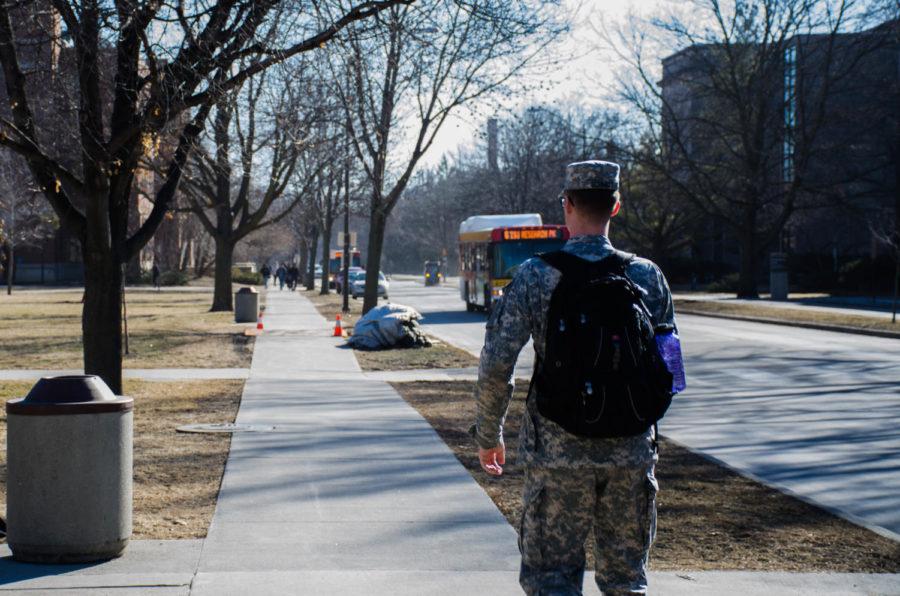Service and statistics: professor studies effectiveness of VA mental health care
Schuyler Smith/Iowa State Daily
Mental health presents major issues for veterans. The effectiveness of treatment options and whether veterans use available resources can deeply impact their future.
March 13, 2015
An ISU professor is chairing a congressionally-mandated study of the use and effectiveness of the Department of Veterans Affairs mental health care services for recent veterans.
Alicia Carriquiry, distinguished professor of statistics, is chairing an 18-person committee tasked with a VA-sponsored Institute of Medicine evaluation to be completed in 2017. She said she hopes it will raise awareness of VA benefits and spark positive change in the VA.
“Even if you are opposed to the war, you cannot possibly be opposed to the veterans,” Carriquiry said.
The evaluation will analyze the quality and capacity of services provided to veterans of Operation Enduring Freedom, Operation Iraqi Freedom and Operation New Dawn as well as barriers they may face in accessing services, according to the Institute of Medicine.
The committee will study scientific research, hold interviews and conduct surveys and site visits. They will then prepare a consensus report of recommendations to increase access and effectiveness of VA mental health care that will be given to the secretary of the VA.
The Institute of Medicine, part of the National Academies, is a private and nonprofit. Carriquiry said objectivity is important and the institute wanted a panel of people with “no horse in the race.” She had no previous connections with veterans.
“People who are involved with veterans and the VA feel very passionate about these issues,” she said. “Passion is good, but sometimes it is a barrier to looking at information objectively.”
The study has given her a new view toward veterans.
“You learn about the struggles that many of these veterans go through once they get back home,” she said. “If you don’t feel for them, you have no heart.”
Approximately 2.7 million troops had served in Iraq and Afghanistan as of September 2014, according to the VA.
“I think the VA has got more than they can handle,” said Brett McLain, director of Story County Veterans Affairs. “I don’t think they have the manpower.”
The VA provides relatable medical advice to service members, McLain said. He invites veterans to set up a meeting with him to discuss their benefits.
McLain served in the U.S. Navy for 21 years and has worked at Story County Veterans Affairs for 16 years. In the Navy he said he once did not see land for 110 consecutive days, and he recognizes the contrast between military and civilian settings.
“It’s a different life,” he said.
In January, the VA released a report on VA health care use by veterans of Operation Enduring Freedom, Operation Iraqi Freedom and Operation New Dawn between October 2002 and September 2014. It reported that mental disorders accounted for 56.9 percent of the diagnoses among them, with 640,537 veterans having been treated for mental health disorders by the VA in that time period.
In order of decreasing prevalence, these disorders include PTSD, depressive disorders, neurotic disorders, affective psychoses, alcohol dependence, drug abuse, non-classified special symptoms, drug dependence, sexual deviations and disorders and disorders due to brain damage, according to the report.
“Mental health and medical health in my mind are at the same level,” McLain said. “There’s treatment and medication for both.”
It is becoming more understood that mental health is a health issue, but “soldier culture” might prevent veterans from seeking help, Carriquiry said.
“Sometimes they find little sympathy,” she said.
Statistics impacts lives in ways that people may not notice, said Ulrike Genschel, assistant professor of statistics.
“I think these studies are hugely important to help the veterans in our community,” she said. “We owe it to them for what they’ve given to our country.”
It is important to let the data speak for itself, she said.
“You can do tremendous things as long as you have the data and analyze it objectively,” she said.
Carriquiry said teaching at a university can feel like being in a bubble and studies like this are a reality check.
“There’s a lot of people that need a lot of help out there,” she said.

















